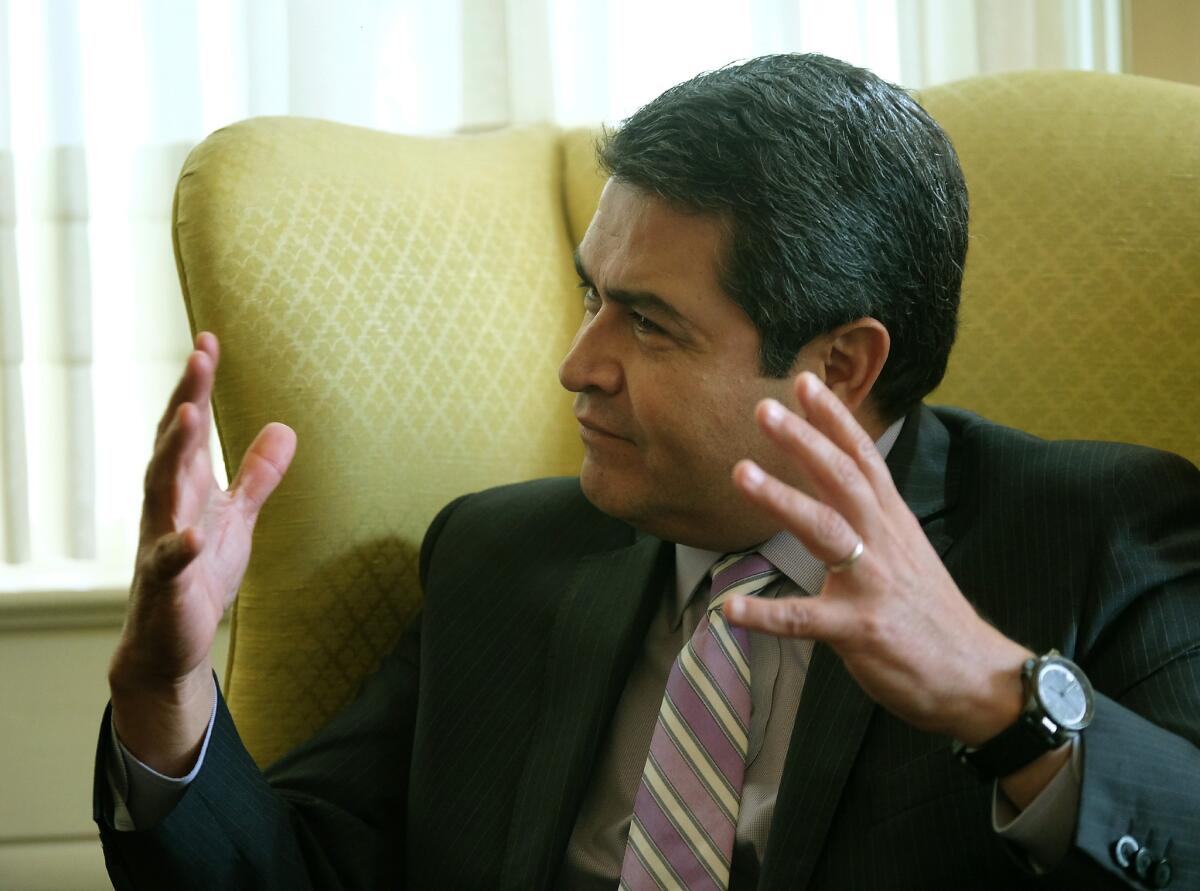A Honduran coup comes full circle

Honduras President Juan Orlando Hernandez speaks with Texas Gov. Greg Abbott during a meeting at the governor’s mansion in Austin, Texas, on Thursday.
- Share via
Reporting from Mexico City — In 2009, a group of Honduran politicians and military officers staged a coup and removed then-President Manuel Zelaya from office and from the country. The stated motive was to prevent Zelaya from changing the constitution so that he could run for re-election and hold on to power.
Now, some of the same Hondurans who backed that coup have helped do exactly what they said they opposed.
The Honduran Supreme Court has struck down an article of the constitution that prohibited a sitting or former president from seeking a second term. The move had vigorous backing from President Juan Orlando Hernandez, who will now be allowed to run for re-election.
The move also replicates steps taken in other countries such as Nicaragua, Ecuador and Venezuela, where presidents have stacked courts and election boards or changed laws and constitutions so that they can stay in power, sometimes indefinitely.
Opposition parties cried foul, warning that Hernandez, a conservative from the National Party, was moving toward a dictatorship, his re-election virtually assured given the vast state resources he would be able to marshal for any political campaign.
“It is a very worrisome situation,” former Judge Guillermo Lopez, past president of the Assn. of Judges for Democracy, said in a telephone interview from Tegucigalpa, the Honduran capital. “If [Hernandez] goes for a second and then a third term, we could have a situation with curtailed freedoms becoming ever more obvious.”
Lopez was one of a handful of judges fired in fallout from the coup, in which Zelaya, who had taken a hard turn to the left in his policies, was rousted from bed by army officers and put on a plane to Costa Rica.
Backers of the coup, including members of the National Party and even some officials from Zelaya’s own Liberal Party, said at the time that Zelaya’s efforts to hold a constituent assembly were really only a guise to set up changes in the constitution that would have allowed re-election. He denied that was his ulterior motive.
The years since the coup have been marked by a huge uptick in violence, including the slayings of labor activists, peasants, politicians and journalists, with Hernandez responding by giving more authority to the military.
Zelaya was eventually allowed to return to Honduras, where he formed a new party. In 2013, his wife, Xiomara Castro, ran for president unsuccessfully against Hernandez. Zelaya has said he has no intention of trying to run for president again, even if the court’s new ruling stands.
The way the ban was stuck down was clouded in confusion. Responding to a petition from a group of legislators, a five-member panel of the Supreme Court voted unanimously Wednesday to void the constitution’s re-election ban. All five justices were appointed by Hernandez or his proxies.
There was an immediate outcry from opponents, and on Thursday one of the judges announced he was withdrawing his approval and voting against the change.
With the decision no longer unanimous, the case would have to be heard by the full 15-member court. But for reasons not completely clear, the government’s official Gazette went ahead and rushed to publish the ruling as unanimous on Friday. With that, it enters into effect.
Returning from a trip to the United States over the weekend, Hernandez declined to comment on the court’s decision or the way it was handled, saying, “Let me work.”
Opponents, including the major opposition political parties, said the ruling tramples on the constitution and shatters an important covenant with the public. Many countries in Latin America had bans on re-election as a response to decades of dictatorships and one-party rule.
“There is nothing confusing, murky or contradictory” about the constitution’s ban on re-election, columnist Max Velasquez Diaz wrote in the Honduran newspaper La Tribuna. “Murky, confusing and contradictory is [the court’s] ruling.”
Proponents said it was unconstitutional in the first place to prohibit a sitting or former president to become a candidate again. It was not clear if term limits will eventually be added to Honduras’ electoral system.
“Is presidential re-election a false step for the incipient, weak and malleable Honduran democracy?” columnist Aldo Romero asked. “The near future will bring an answer, but what is certain is that we are subjected to the pressure of ‘Latin American re-election fever,’ where those who have it don’t want to give up power, and those who don’t are desperate to return.”
Follow @TracyKWilkinson on Twitter for more news from Latin America
Sign up for Essential California
The most important California stories and recommendations in your inbox every morning.
You may occasionally receive promotional content from the Los Angeles Times.








